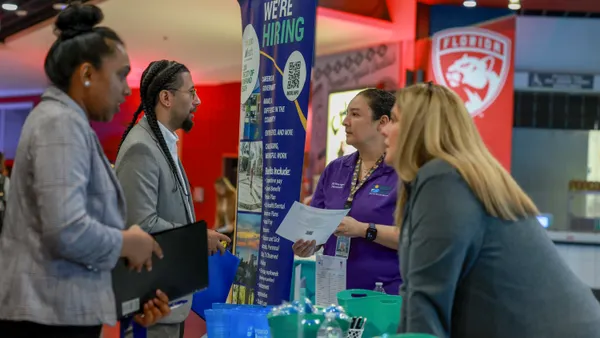Dive Brief:
- More than a third of workers expect their organizations will be more relaxed about remote work after the pandemic subsides, according to a OnePoll and Citrix survey conducted between April 2 and April 14. The arrangement has proven popular; 28% said they plan to search for work that allows them to telecommute. At the same time, a third of the 2,000 respondents — all of whom are working from home due to the novel coronavirus — said they are eager to get back to the office and thought their colleagues felt similarly.
- Most respondents (45%) said their employers were "fairly ready" for the telework transition, and 38% reported their organizations had an easy time making the jump. Eighteen percent said their employers were not very ready or not ready at all.
- As for workers' own transitions, respondents most commonly cited their home Wi-Fi as a tech challenge. Overall, a third said they have felt overwhelmed due to their remote work situation. Another third, however, said they have enjoyed "the peace and quiet." Slightly fewer said their full houses have distracted them, and 28% reported being lonely.
Dive Insight:
Workers predicted back in March that they would complete their work efficiently if their operations went remote due to the pandemic, Glassdoor survey results revealed. If the OnePoll and Citrix survey is any indication, it may be too early to determine the lasting effects of what Bloomberg called "the world's largest work-from-home experiment."
While a third in the Citrix survey said they expect their employers to accept more remote work requests, another third said they and their colleagues are itching to get back to the office. The survey also chronicled the perks of the remote work situation, in addition to its pitfalls. Respondents reported enjoying wearing slippers and pajamas, skipping showers and sleeping in, but many cited telework frustrations ranging in severity. For instance, of the 1,815 workers who said they have work video calls, 44% said they've signed onto a meeting without realizing they were on camera. Nearly half of those who had done this said they were doing chores when this happened. Forty-one percent reported being in the bathroom.
Other technical problems caused respondents trouble. Security protocols were the most challenging tech problem for a third of workers, followed by conflicting conference call platforms, app accessibility and device availability. Companies may be able to solve some of these problems by assessing the remote work experience of workers based on their job functions, sources previously told HR Dive. A highly interactive team may need a protocol for video-enabled meetings, while a more independent group of workers would benefit from the proper tools they're set up with at the office.













